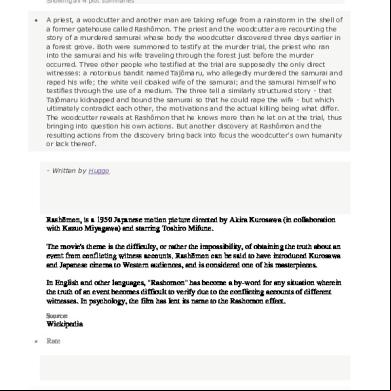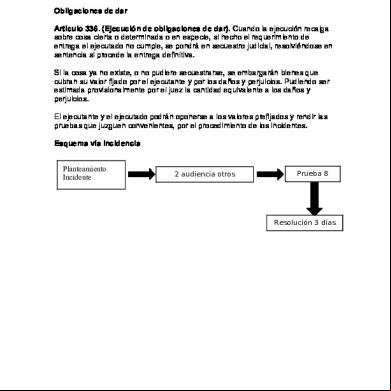Ideals Of Naturalism In Ryunosuke Akutagawa's "rashomon" h3i5d
This document was ed by and they confirmed that they have the permission to share it. If you are author or own the copyright of this book, please report to us by using this report form. Report 2z6p3t
Overview 5o1f4z
& View Ideals Of Naturalism In Ryunosuke Akutagawa's "rashomon" as PDF for free.
More details 6z3438
- Words: 1,182
- Pages: 4
Alicia Louise Catibayan BSE31 October 16, 2009 Ideals of Naturalism in Ryunosuke Akutagawa's "Rashomon" Naturalism is a literary movement that began roughly in the 19th century. It is the development of realism where naturalism seeks to imitate a common situation in everyday life focusing on the darker side of life. The characteristics of naturalism evident in Ryunosuke Akutagawa's "Rashomon" are: detachment of the observer to the characters and its keen attention to setting and animal imagery, the exposure of the brutal side of the characters, their status in the society, and their uncontrollable will against the indifferent force of nature leading them to their inevitable death. The detachment of the observer in Akutagawa's "Rashomon" is very noticeable as the observer left the main character nameless and only introduced him as a servant of a samurai. All the other characters like the samurai himself and the old woman were also nameless. The observer simply moved on and gave more interest in the setting which is the gate called Rashomon and the place where it stood, Kyoto. The observer then describes Kyoto in the most pessimistic way, "Kyo¯to had been visited by a series of calamities, earthquakes, whirlwinds, and fires, and Kyo¯to had been greatly devastated." It only amplifies naturalism in this text. The observer is sharing the harshness of life as he describes Kyoto and Rashomon in its worst condition in great detail. The characters also show the same depressing situations as they choose between death and surviving by being a criminal. Another characteristic of naturalism is animal imagery. Akutagawa's works had used plenty of animal imagery. In Rashomon, the observer explained the characters actions more by using animal imagery. "As quietly as a lizard, the servant crept up to the top of the steep stairs." and "laying hands on the head of the corpse,
she began to pull out the long hairs one by one, as a monkey kills the lice of her young." were two of many animal imagery used. The observer also uses nature to symbolize the fate of the unfortunate servant. "Thus, confined by the rain, he was at a loss to know where to go." Although he knew the rain would eventually stop, he would still have nowhere to go. The rain can symbolize his dilemma as it only continued to pour, as if never ending. The observer focused on the servant's choices through the unfortunate event that had turned him into a homeless man. The character was already a servant - a status where it is in the lower socioeconomic class but still fate had something far worse to give to the main character. The servant of the samurai had been discharged because of the rapid declining prosperity of Kyoto. He was now even poorer than before. It is said that he is confused on where to go next or how to make a living tomorrow. Until he saw smoke coming out from the roof of the gate, indicating that someone is there. He had a choice to make, either to steal and survive or starve and face the inevitable death. Both choices only spell out terrible outcomes. But fate gave him no other choices. The servant chose to fight for his life and ultimately chose to steal to survive. Eventually whatever choice the servant had made it still lead to his unexpected death. He stole from an old woman whom he thought was a wretched old hag for doing the exact same thing as what he was doing, stealing. Even though he was stronger than the old woman, there is nothing that he can escape from the clutches of fate. The observer explained his death, "The yellow clothes he had wrested off were under his arm, and in a twinkling he had rushed down the steep stairs into the abyss of night. The thunder of his descending steps pounded in the hollow tower, and then it was quiet." By only a mere incident did he knew will end his life.
Another character in the story was the old woman, or the old hag which the servant had named her. She was found by the servant pulling a hair of a dead woman's body. Her character also showed her brutal side as she explained why she was stealing the hair of the dead woman, "Indeed, making wigs out of the hair of the dead may seem a great evil to you, but these that are here deserve no better. This woman, whose beautiful black hair I was pulling, used to sell cut and dried snake flesh at the guard barracks, saying that it was dried fish. If she hadn't died of the plague, she'd be selling it now. The guards liked to buy from her, and used to say her fish was tasty. What she did couldn't be wrong, because if she hadn't, she would have starved to death. There was no other choice. If she knew I had to do this in order to live, she probably wouldn't care." The old woman said that she had no choice. Her life is also controlled by the indifferent universe as her fate had forced her to either make a wig and live or to starve to death. She also told about the dead woman's story which had the same situation as the servant and the old lady. The story only shows that everyone was affected by the economic crisis of Kyoto. To put it in a naturalistic point of view, every man will always have no fight against their fate. They will be forever fighting against destiny only to fall into their inevitable deaths. The servant, the old lady, and even the dead woman can be compared to the gate, Rashomon. In the story, the gate was described as "the largest gate in Kyoto, the ancient capital of Japan. It was 106 feet wide and 26 feet deep, and was topped with a ridge−pole; its stone−wall rose 75 feet high. This gate was constructed in 789 when the then capital of Japan was transferred to Kyoto. With the decline of West Kyoto, the gate fell into bad repair, cracking and crumbling in many places." The gate had been abandoned after the decline of the prosperity of Kyoto, much like the characters in the story. The Rashomon can also symbolize the whole world for
naturalists. "The gate has become a hide−out for thieves and robbers and a place for abandoning unclaimed corpses." Much like the world today, with immeasurable problems such as the economic crisis and natural disasters ing in the trouble. Humans are forced to make the worst decisions to be able to survive. Man is living in an indifferent world - a mad world full of filth that influences man and controls man to his doom. Rashomon was filled with corpses of people who are wicked like the dead woman. It is also a place where people like the servant and the old lady, are forced to live there due to the consequences, not of their actions, but to the actions of destiny and of the universe.
she began to pull out the long hairs one by one, as a monkey kills the lice of her young." were two of many animal imagery used. The observer also uses nature to symbolize the fate of the unfortunate servant. "Thus, confined by the rain, he was at a loss to know where to go." Although he knew the rain would eventually stop, he would still have nowhere to go. The rain can symbolize his dilemma as it only continued to pour, as if never ending. The observer focused on the servant's choices through the unfortunate event that had turned him into a homeless man. The character was already a servant - a status where it is in the lower socioeconomic class but still fate had something far worse to give to the main character. The servant of the samurai had been discharged because of the rapid declining prosperity of Kyoto. He was now even poorer than before. It is said that he is confused on where to go next or how to make a living tomorrow. Until he saw smoke coming out from the roof of the gate, indicating that someone is there. He had a choice to make, either to steal and survive or starve and face the inevitable death. Both choices only spell out terrible outcomes. But fate gave him no other choices. The servant chose to fight for his life and ultimately chose to steal to survive. Eventually whatever choice the servant had made it still lead to his unexpected death. He stole from an old woman whom he thought was a wretched old hag for doing the exact same thing as what he was doing, stealing. Even though he was stronger than the old woman, there is nothing that he can escape from the clutches of fate. The observer explained his death, "The yellow clothes he had wrested off were under his arm, and in a twinkling he had rushed down the steep stairs into the abyss of night. The thunder of his descending steps pounded in the hollow tower, and then it was quiet." By only a mere incident did he knew will end his life.
Another character in the story was the old woman, or the old hag which the servant had named her. She was found by the servant pulling a hair of a dead woman's body. Her character also showed her brutal side as she explained why she was stealing the hair of the dead woman, "Indeed, making wigs out of the hair of the dead may seem a great evil to you, but these that are here deserve no better. This woman, whose beautiful black hair I was pulling, used to sell cut and dried snake flesh at the guard barracks, saying that it was dried fish. If she hadn't died of the plague, she'd be selling it now. The guards liked to buy from her, and used to say her fish was tasty. What she did couldn't be wrong, because if she hadn't, she would have starved to death. There was no other choice. If she knew I had to do this in order to live, she probably wouldn't care." The old woman said that she had no choice. Her life is also controlled by the indifferent universe as her fate had forced her to either make a wig and live or to starve to death. She also told about the dead woman's story which had the same situation as the servant and the old lady. The story only shows that everyone was affected by the economic crisis of Kyoto. To put it in a naturalistic point of view, every man will always have no fight against their fate. They will be forever fighting against destiny only to fall into their inevitable deaths. The servant, the old lady, and even the dead woman can be compared to the gate, Rashomon. In the story, the gate was described as "the largest gate in Kyoto, the ancient capital of Japan. It was 106 feet wide and 26 feet deep, and was topped with a ridge−pole; its stone−wall rose 75 feet high. This gate was constructed in 789 when the then capital of Japan was transferred to Kyoto. With the decline of West Kyoto, the gate fell into bad repair, cracking and crumbling in many places." The gate had been abandoned after the decline of the prosperity of Kyoto, much like the characters in the story. The Rashomon can also symbolize the whole world for
naturalists. "The gate has become a hide−out for thieves and robbers and a place for abandoning unclaimed corpses." Much like the world today, with immeasurable problems such as the economic crisis and natural disasters ing in the trouble. Humans are forced to make the worst decisions to be able to survive. Man is living in an indifferent world - a mad world full of filth that influences man and controls man to his doom. Rashomon was filled with corpses of people who are wicked like the dead woman. It is also a place where people like the servant and the old lady, are forced to live there due to the consequences, not of their actions, but to the actions of destiny and of the universe.










